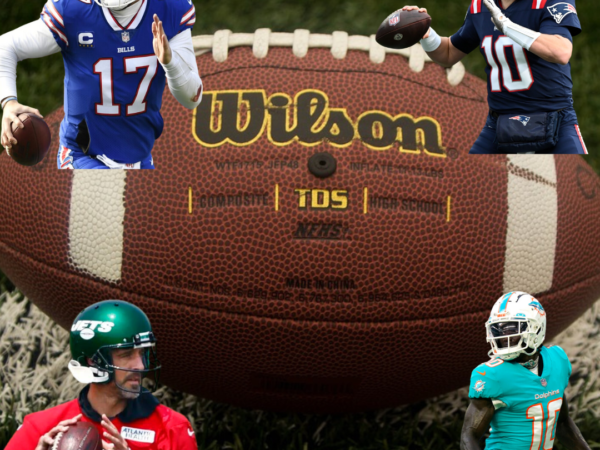I’m married to a high school head football coach, meaning I’m not just married to him, but to the game. We have a 7 year old son who absolutely loves the game of football; he knows the lingo, he sits in all weather to watch his dad and his players. He plays football…..in the back yard, in a flag league, on the beach, in the pool, basically plays football everywhere, except he will not play football on a youth tackle team. That’s right, the son of a football coach will not play youth tackle football for years to come.
Football is hard, it’s not just a bunch of “dumb jocks” hitting people as hard as they can. There is so much calculated thought in play calling, there is a lot to learn when reading the defense, reading the blockers and making split second decisions while being chased by a lineman twice your size. This sport is not for the weak, it is not for the dumb and it is not for young kids.
I am guessing most parents of youth tackle football players fully believe their child is doing what is best if they would like to continue to play football into middle school, high school and possibly beyond. However, I am going to inform you through studies and examples that playing youth tackle football IS NOT WORTH it.
Let’s first talk about safety, after all we have heard and read at length about all the risks of head injuries in football, but do you know with proper technique and age, many head injuries can be prevented? The helmet: the most important piece of safety equipment a football player can wear and yet so many players do not wear a helmet that properly fits. My husband’s players are personally fitted by a representative of Riddell, a well known helmet manufacturer, to ensure the helmet fits each player the way it is intended. High school football, at least in Ohio, has a 10 day acclimation period before any player to player contact is practiced. Meaning, the high school teams can begin contact on August 1st, however cannot practice player to player contact until the individual player has gone against tackling dummies for 10 days while wearing pads. If there is a player who missed a day of the acclimation period for any reason, that individual may sit out during a practice or even scrimmage due to the safety policy. If there is this much safety protocol for teenage boys, why are these protocols not in place for third grade boys?
Those who read this and have participants in youth tackle football will most likely say to themselves, “Well we have adults fitting our kids’ helmets and their safety is their top priority,” which I have no doubt this is true. However, the coaches of our high school players are not the ones fitting our athletes, it’s a professional. I am sure the youth coach has nothing but the interest of their players in mind, but there is still not a safety protocol in place with an acclimation period. Not to mention, if you put a helmet and pads on a bunch of 8, 9 and 10 year olds, they most likely want to HIT someone! So let’s talk about the impact with every hit. According to the Wake Forest School of Medicine, those playing tackle football between ages 8 and 13 for just one season, have diminished brain function in various parts of their brain.
Boston University found through studies that those who played tackle football before the age of 12 showed more behavioral and cognitive problems later in life than those who waited until after age 12 to play tackle. While not every youth athlete suffers from a head injury, with every hit to the head, the brain shifts, even for just a moment. The more hits over the years, the more damage done to a young, developing brain.
I actually took a poll in a Facebook Group I’m a part of, American Football Coaches Wives Association, and asked the opinion of the wives who could vote based on their personal experiences, beliefs or on behalf of their coach. I learned my husband and I are not the only ones with this mindset on youth tackle football. I asked the wives if they and their husbands (all of which are football coaches for various levels) felt youth tackle football was beneficial for football later in life and of the 143 votes, only six voters felt youth tackle football was beneficial for learning the game of football and growing as a football player. 80 voters felt youth tackle football was not beneficial for learning the game of football or growing as a football player and 55 of the voters felt you could learn the game of football and grow as a football player by playing flag football. There were only two voters who did not feel youth football (tackle or flag) was not beneficial at all.
My point is, those closest to the game do not find youth tackle football beneficial. Please do not think that your son or daughter must play tackle football to learn the game of football or to even grow as a football player. I’m aware most parents feel their child learns more off the field than they do on the field, but those off the field lessons can be taught through other avenues of life.
If you don’t want to take the word of unknown coaches and their wives, it’s also been recorded that Troy Aikman, former quarterback of the Dallas Cowboys, and Mike Ditka, former player and coach of the Chicago Bears, have both spoken out about not allowing their children to play youth tackle football. As members of the football community we hate to see the number of football participants decline. We don’t want football to become the next boxing, where it has nearly gone extinct because of injuries. We love football and fully believe in the life lessons it teaches later in life. While many youth tackle participants have not had a diagnosed concussion, those who have know first hand the severity of a head injury at such a young age.
Please help save our sport by NOT playing youth tackle football. Wait a few years, let your children’s bodies develop a little longer before they start hitting others time and time again. We all know our kids’ will change physically and emotionally between 3rd grade, 7th grade, 9th grade and 12th grade. What they do at age 8 shows no indication on what they do at age 18. Let’s keep the interest of the kids and play flag football. Teach them the game, let them have fun and once their bodies are bigger and naturally stronger, then let them take the proper safety measures to step out onto the grid iron.









